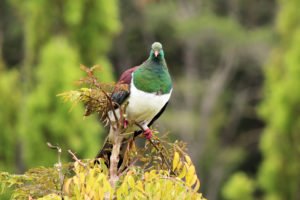It might seem surprising coming from a conservationist, but sustainable harvest of kereru could satisfy everyone’s needs, writes AUT’s Professor Len Gillman in the New Zealand Herald.
 An excerpt (read in full):
An excerpt (read in full):
The main cause of kereru decline is predation and competition from mammalian pests, not hunting, and controlling these pests with natural poisons such as 1080 has been shown to promote their recovery. With ongoing predator control, populations increase until they reach a point where, limited by resources, surviving fledglings entering the local population roughly equal those leaving the population due to emigration and mortality.
When a population reaches stability, small harvests can be made without affecting the total number of birds, because those removed by harvest allow more fledglings to survive. This concept is known as a sustainable harvest – it allows a small ongoing harvest without affecting the size of the population. Harvesting quotas would need to be based on kereru numbers and age distributions, considering young birds learn survival skills from older birds, but sustainable harvesting holds great promise.
Associated legislation and scientific monitoring could empower iwi to sustainably harvest kereru, by managing areas for pests and demonstrating that bird populations are healthy. In such areas, kereru could be maintained with substantially greater numbers than occur now. There would be more kereru, satisfying conservation objectives. Meanwhile tangata whenua would have an important cultural activity returned to them – allowing for the continuation of their matauranga Maori, via interaction with this taonga species, as guaranteed under the Treaty of Waitangi.